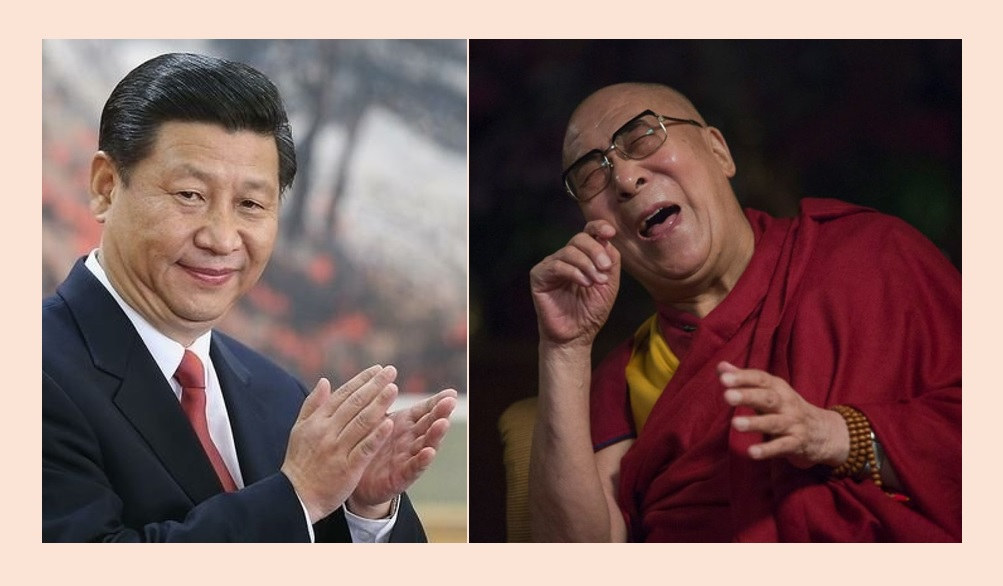Leader for Life, Xi Jinping made a quick, unannounced visit to Tibet—his first as the President of China. Videos surface from the visit, showing Xi in front of the Potala Palace and visiting Nyingchi, a strategically located border town close to Arunachal Pradesh.
Observers say Xi is worried, therefore, he wants to send a message that Tibet is an inalienable part of China. Xi's visit comes at a time when China is involved in a serious border confrontation with India, has threatened Taiwan with a military invasion, has a diplomatic row with Australia, a trade war with the US and lost a maritime dispute with the Philippines. It is also under pressure over Hong Kong where it has blown to bits its benign policy that "one country two systems" could co-exist.
Video circulating on #Weibo showing #XiJinping accompanied by #TAR Party secretary Wu Jingjie in #Lhasa. There has been no official news of any visit by Xi to #Lhasa since 2011. So, could this be a current visit? pic.twitter.com/hG5VSRK3U0
— GeopoliticalUpdates (@GeopolUpdates) July 22, 2021
India Narrative spoke with noted South-East Asia expert, Prof. Baladas Ghoshal, former chairman of the Centre for South and Southeast Asian Studies, JNU, and former General Secretary at the Society for Indian Ocean Studies.
Ghoshal says that from China's point of view, if there is any part of China which is vulnerable, that part is Tibet. "Apart from that China does not feel a threat to any part of its territory from anywhere or any power in the world", says Ghoshal.
China's vulnerability lies in Tibet—which shares a long border with India and where Beijing's relations are on a downhill after it invaded Ladakh. With Chinese troops not moving back from Indian territory despite numerous rounds of diplomatic and military talks, relations between the two Asian giants are frosty and are sliding further as the dispute drags.
In fact, one of the major clashes between the Indian Army and the Chinese involved special Tibetan forces. China has taken cognizance of that as it has become a worrisome point for Xi. China is trying to recruit more Tibetans on its border with India. "Beijing has sent a circular that each Tibetan family has to send one member to the Chinese army", says Ghoshal.
Read More: Photo Feature: Tibetans distribute 86,000 masks and food on the Dalai Lama's 86th birthday
Prime Minister Narendra Modi's recent greetings to Tibetan spiritual leader the Dalai Lama and speaking with him over the phone has been noticed by China. It even sent its troops on the Ladakh border to intimidate Indians over celebrating the Dalai Lama's birthday. Beijing has always been sensitive about the Dalai Lama and has created ruckus numerous times over any mention of the Tibetan spiritual head.
It is because of this simmering tension with India that China is beginning to feel threatened in Tibet.
With Beijing rapidly losing trust among the comity of nations due to its hegemonistic actions, its One China Policy (OCP) is feeling the heat. With tensions in the Taiwan Strait, many countries are beginning to dump the OCP and are thinking aloud about granting some kind of recognition to Taiwan. If that happens, China fears the OCP would be relegated to history.
Read More: China sends second ship to spy on US-Australia military exercise
Talking about the OCP, Ghoshal says: "It was always an India-Tibet border, not an India-China border at the time of Independence. In fact, India used to have certain territorial rights in Tibet which it gave up in favour of China and agreed to sign the OCP. There are many thinkers in India who say that if China does not agree to India's position on Kashmir, we should also not agree to the OCP".
Of all the regions where China has violated human rights or has ongoing conflicts—Hong Kong, Taiwan, Tibet and Xinjiang, it is Tibet where China feels most unsafe. The communist regime does not feel a threat to Xinjiang because of the region's geography, where it is largely insulated.
With so many diplomatic and geopolitical tensions that Xi has launched with countries all around its borders, Xi is beginning to feel susceptible in Tibet—and that explains his visit to the region.
Xi also wants to send a message to the world and to the Tibetans that China will secure Tibet. Ghoshal says: "Xi is giving special attention to Tibet in the prevailing circumstances. With this visit, Xi wants to say that no tinkering should be done with Tibet".




















